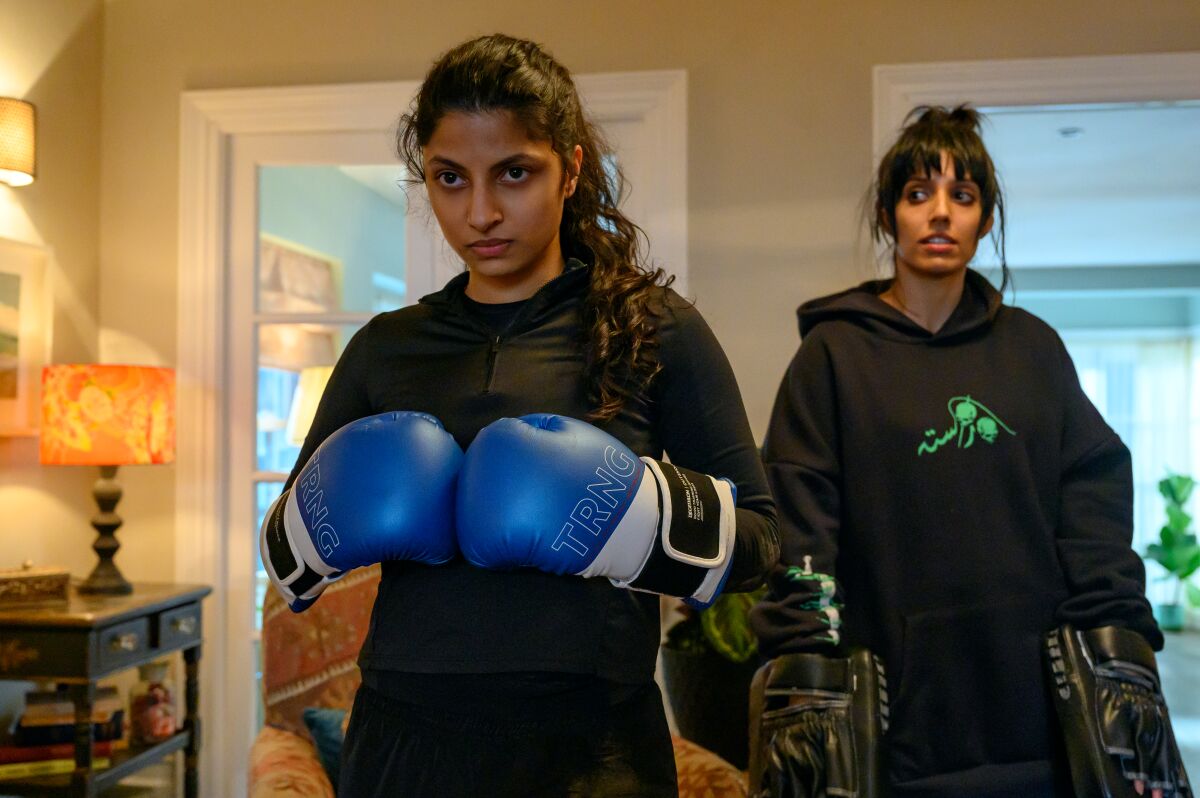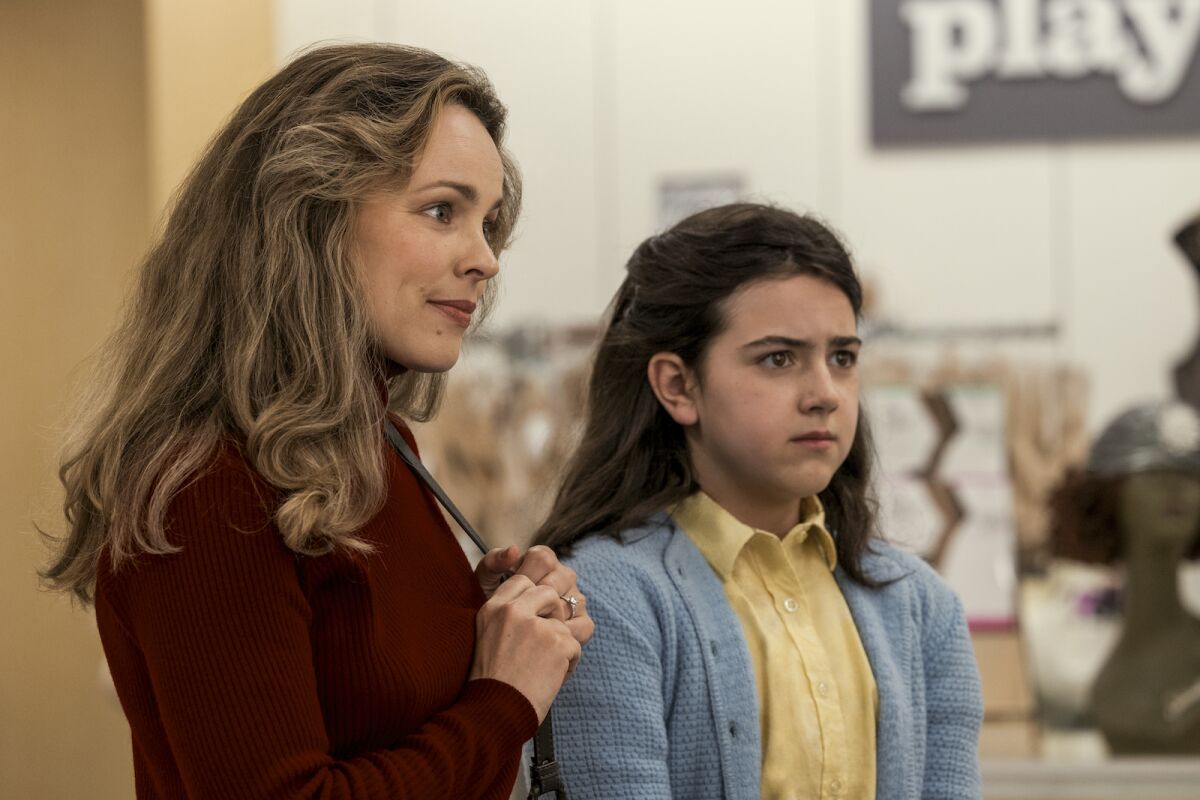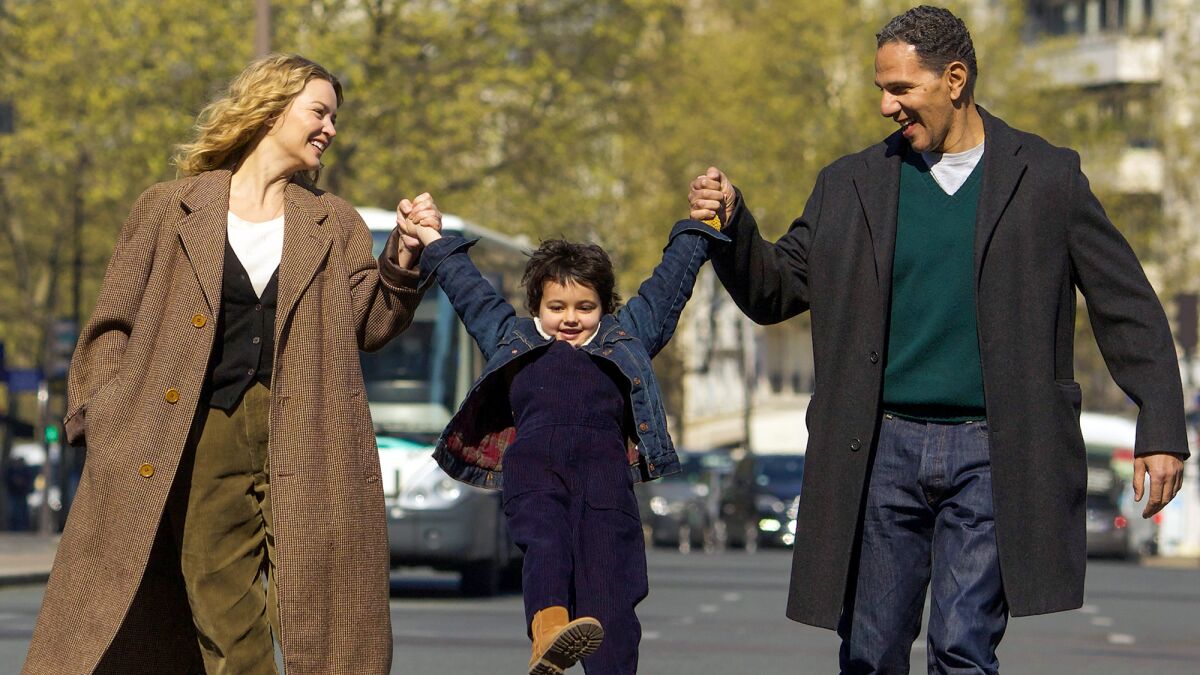Hello! I’m Mark Olsen. Welcome to another edition of your regular field guide to a world of Only Good Movies.
Few people are as deserving of the labels legend and icon as Harry Belafonte, who died this week at age 96. His career as a singer and his performances in films such as “Carmen Jones,” “Odds Against Tomorrow” and “Buck and the Preacher” made him a star, and his work in the more recent “Kansas City” and “BlacKKKlansman” reminded us of his many talents. But Belafonte’s contributions to the civil rights movement and his stature as a beacon of change made him so much more. It is a legacy that will live on.
This is one of those weeks when there are more worthwhile films being released in L.A. than can easily fit in this newsletter. Aside from the three films feature below, Cristian Mungiu’s “R.M.N.” and Lucien Castaing-Taylor and Véréna Paravel’s documentary “De Humani Corporis Fabrica” also hit local theaters this week.
Michael Snow and “Wavelength.” I admit that experimental/avant-garde filmmaking is a blind spot for me and so we probably don’t talk about it enough here. But the community around that filmmaking represents some of the purest examples of truly independent spirits one can hope to find. On April 30, the good folks at the Mezzanine film series, co-presenting with Los Angeles Filmforum, are putting on a tribute to Canadian filmmaker Michael Snow, who died last year at 94. Presented with his short films “Standard Time” and “See You Later (Au Revoir)” will be Snow’s 1967 film “Wavelength” — a rare chance to see it in a theater. The movie is a monumental achievement and a fantastic stepping stone into the world of experimental film for the uninitiated/curious.
“Party Girl” turns up. The 1995 film “Party Girl” is a sly charmer, a time capsule of its moment and one of the best examples of why Parker Posey was such a darling of the indie film scene at the time. (And is still a scene-stealer in the new “Beau Is Afraid.”) The story of an irrepressible NYC club kid (Posey) who takes a job as a librarian, “Party Girl” was just released on Blu-ray by Fun City Editions, and FilmRise is giving its new 4K restoration a limited theatrical run. Director Daisy von Scherler Mayer, who has recently been working on the hit series “Yellowjackets” and “The Marvelous Mrs. Maisel,” will be appearing at screenings at the Landmark Westwood Friday, April 28, and the Laemmle Glendale on Saturday, April 29.
Screening series two-fer. The next two Mondays will see us hosting Indie Focus screening series events at the Culver Theater in Culver City. On Monday, May 1, we’ll have a screening of “Book Club: The Next Chapter” with director and writer Bill Holderman and producer and writer Erin Simms for a Q&A.
Then on Monday, May 8 we will have a screening of “Blackberry” followed by a Q&A with director, co-writer and actor Matt Johnson and actors Glenn Howerton and Jay Baruchel.
Enjoying this newsletter? Consider subscribing to the Los Angeles Times
Your support helps us deliver the news that matters most. Become a subscriber.
‘Polite Society’
The debut feature from writer and director Nida Manzoor (creator of the TV series “We Are Lady Parts”), “Polite Society” is an inventively wild action-comedy about Ria (exuberant newcomer Priya Kansara), a teenage aspiring stuntwoman who becomes obsessed when her older sister Lena (Ritu Arya) becomes engaged to a fiancé with a suspicious mother (Nimra Bucha). Ria becomes determined to break them up. An original blend of genres with a playful sensibility, the film is in theaters now.
For The Times, Robert Abele wrote, “Giving off throwback appeal and new-energy sparks, ‘Polite Society’ is the kind of reality-tinged comic adventure that, with Kansara’s delightful leading-the-charge performance, puts you in Ria’s headspace of overactive adolescent righteousness so easily that it hasn’t been this much fun rooting for someone — which includes laughing at their brashness and even cringing at their mistakes — in a long, long while. … ‘Polite Society’ doesn’t need the slickest fight choreography or the most innovative plot devices or the zingiest lines to make its combo platter work, either. Manzoor, an instinctive stylist, always finds an honest vibe to win you over, whether it’s sisterly camaraderie (or annoyance), youthful awkwardness or you’re-going-down spunk, which allows the abundant personality in her wonderful cast to hit all the necessary top notes.”
Tracy Brown spoke to Kansara, who spoke about quitting her office day job to pursue acting full time during the pandemic. As she said, “Perhaps at the time it would have been considered psychopathic because I hadn’t actually booked a job or had any credits. I was just diving into the deep end, hoping for the best, but it totally worked out so I’m glad I made that decision.” Also, Manzoor is part of “The Independents,” The Times continuing project chronicling a year in the life of seven Sundance filmmakers.
For the New York Times, Amy Nicholson wrote, “It’s a delight that borrows from everything — westerns, musicals, heist capers, horror, Jane Austen and James Bond — to build its writer and director, Nida Manzoor, into a promising new thing: a first-time filmmaker impatient to evolve cultural representation from the last few years of self-conscious vitamins into crowd-pleasing candy. … Here, as in her marvelous six-episode sitcom ‘We Are Lady Parts,’ about an all-girl Muslim punk band, Manzoor views the overlapping identities of being young and female and devout-to-varying-degrees as though, together, they form a kaleidoscope of possibilities. Look at all these new characters we can create, her work seems to say, as she presents a punk band manager who vapes underneath a pleather niqab. Isn’t the world more exciting with all of these jagged colors?”
For the Playlist, Poulomi Das wrote, “There’s a comic book quality to how Manzoor constructs ‘Polite Society’ as a coming-of-age comedy, mainly in how her punchy script imagines battle sequences as an outlet for Ria’s teenage angst. … Perhaps, the film’s crowning glory is Manzoor succeeding in complementing the film’s wild, riotous narrative detours (paying homage to everything from ‘Devdas,’ ‘Everything Everywhere All at Once,’ to ‘Ocean’s Twelve’ and ‘Sixteen Candles’) with breathless, high-octane energy throughout its 104-minute-runtime. A large part of that is only possible because of the naturalism of Kansara and Arya’s turns — genuine without being overly sentimental — and their impeccable, lived-in chemistry. If there’s anything better than watching two young, brown women be thoroughly badass onscreen, then it’s the realization that films like ‘Polite Society’ are a necessary reminder that feminine anxieties — both polite and impolite — deserve to be treated as compelling movie subjects.”
For Deadline, Valerie Complex wrote, “‘Polite Society’ is a fun story about what happens when families are split between tradition and modernism, and how to find the balance between the two. … Overall, this is a fun film that explores cultural norms, and when they aren’t adhered to, it can be seen as an impolite gesture not to conform. But it isn’t a condemnation of these rules so much as a critique on them, and why some people choose not to accept these particular sets of rules. It’s always cool learning new things in inventive ways without having to pile trauma on top of it. The cast is having a good time, especially Bucha who is fantastic as the story‘s villain. ‘Polite Society’ isn’t perfect, but worth taking a chance for some good laughs and a good time.”

Priya Kansara, left, stars as Ria Khan and Ritu Arya as her sister Lena in director Nida Manzoor’s “Polite Society.”
(Parisa Taghizadeh / Focus Features)
‘Are You There God? It’s Me, Margaret’
Directed and written by Kelly Fremon Craig, “Are You There God? It’s Me, Margaret” is an adaptation of Judy Blume’s much loved 1970 novel. In the film, 11-year-old Margaret Simon (Abby Ryder Fortson) moves to New Jersey with her parents, Barbara and Herb (Rachel McAdams, Benny Safdie), away from her beloved grandmother (Kathy Bates). Margaret faces the beginning of puberty and a crisis of faith with equal parts fear, confusion and curiosity. The movie is in theaters now.
For Tribune News Service, Katie Walsh wrote, “[Fremon Craig] delivers a wonderfully lived-in family dramedy about religion and sexuality and the importance of girls’ stories. It’s a film that is both warmly entertaining and downright revolutionary, considering the current state of discourse and legislation about women’s bodies in our country. … Fremon Craig updates Blume’s classic text while maintaining the authenticity and intimacy with which so many readers connected. She draws out themes that feel as trenchant as ever, especially the essential truth that bodies, in all their mysterious and unruly ways, cannot be controlled, not by ourselves and not by others. Our bodies — ourselves — are ours alone, as are our actions, our lives and our stories. “Are You There God? It’s Me, Margaret” proves to be a powerful and moving reminder of this crucial life lesson that can be all too easy to forget.”
For The Times, Bonnie Johnson gathered with Fremon Craig, Blume and producer James L. Brooks for a conversation. Blume in particular spoke about the additions to the film’s story and whether the expanded story line for McAdam’s mother character reflected her own experiences by saying, “It’s one of the ways I think the movie is better than the book. The book is internal, and if you’re a kid reading it, this is what you want to read about. You don’t want to read about your mother’s life. But when you’re watching a film, you need to know who Barbara Simon is. You never learn that in the book because it’s just Margaret’s point of view; she’s Mom. But she’s a real person, and Kelly made that happen. I never thought of her as being me in any way, no. So it’s all a great surprise, then.”
For the New York Times, Lisa Kennedy wrote, “As in the book, published in 1970, the issues challenging the United States at the time lie beyond the story’s frame. … With subtlety, Craig breaks from the novel’s sweet-natured, first-person narration and transforms it into an overall aura. ‘Are You There God’ becomes a coming-of-age saga for three generations of Simon women. McAdams makes quietly clear Barbara Simon isn’t entirely comfortable in her role as suburban mom. Bates’s Sylvia will be nudged to expand her own horizons after Margaret, her little best friend, moves.”
For the AP, Lindsey Bahr wrote, “There is not a cynical molecule in the big-screen adaptation of ‘Are You There God? It’s Me, Margaret,’ a sweet, playful and reverential adaptation of Judy Blume’s famed coming-of-age novel about the everyday problems of an 11-year-old girl. Perhaps it shouldn’t have been earthshattering for someone to write frankly about puberty for an audience who was going through it, but it was and, in many ways, still is. … Movies like these barely exist anymore, and certainly not in theaters. Tween girls would do well to seek ‘Are You There God? It’s Me, Margaret’ out. It has all the makings of a classic for the next generation.”
For Slate, Dana Stevens wrote, “Lurking within this film’s coming-of-age story is a subplot about women’s liberation in the style of ’70s classics like ‘An Unmarried Woman,’ with a radiant McAdams nearly stealing the show from the also-extraordinary newcomer Abby Ryder Fortson as Margaret. What keeps that theft from occurring is how fully the two seem like a real mother and daughter, each with her own inner struggles. Margaret is a girl aching to become a woman, while Barbara, who’s been estranged from her fundamentalist Christian parents since marrying a Jewish man 14 years earlier, is a woman in exile from the girl she used to be. … Craig’s adaptation treats Margaret’s religious questioning with as much curiosity and respect as it does her budding sexuality.”

Rachel McAdams, left, and Abby Ryder Fortson in “Are You There God? It’s Me, Margaret. “
(Dana Hawley / Lionsgate)
‘Other People’s Children’
Written and directed by French filmmaker Rebecca Zlotowski, “Other People’s Children” is a mature exploration of romance amid the contours of an adult life. Forty-year-old Rachel (Virginie Efira) begins a relationship with Ali (Roschdy Zem) and over time his 4-year-old daughter Leila (Callie Ferreira-Goncalves) also becomes a part of her life. Acclaimed documentarian Frederick Wiseman has a small, sly role as a gynecologist. The movie is in theaters now.
For The Times, Justin Chang wrote, “Partly drawn from Zlotowski’s own personal experience, ‘Other People’s Children’ sneaks up on you, with a depth and complexity of feeling that throws those glossy, idyllic opening moments into bittersweet relief. It is, like some of the filmmaker’s earlier movies (‘Grand Central,’ ‘An Easy Girl’), a story of unarticulated tensions and inconvenient desires, and it treats smart, self-aware, complicated female characters not as an accomplishment but as a given. Ali’s focus may be divided among the women in his life (‘my ladies,’ he calls them affectionately), but the movie grants all its time and attention to Rachel, whom Zlotowski and Efira reveal bit by bit, scene by scene.”
For the New York Times, Manohla Dargis wrote, ““Other People’s Children” is romantic — tender, sexy, very French — but even as Rachel’s relationship with Ali deepens, growing more committed and consequently richer and trickier, you never lose sight of the sweep of her life. Zlotowski mixes scenes of the lovers in with interludes of Rachel alone and with other people, as if to remind you of the character’s horizons: She’s alive to love but also to the world. … With palpable gentleness Zlotowski punctures the beautiful bubble that Rachel has been floating in from the beginning of her love affair, a deflation that — like the doctor’s sobering news — makes you reconsider the story’s initial lush romanticism.”

Virginie Efira, left, Callie Ferreira-Goncalves and Roschdy Zem in the movie “Other People’s Children.”
(Music Box Films)
Stay connected with us on social media platform for instant update click here to join our Twitter, & Facebook
We are now on Telegram. Click here to join our channel (@TechiUpdate) and stay updated with the latest Technology headlines.
For all the latest Music News Click Here
